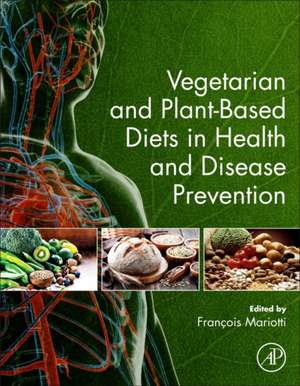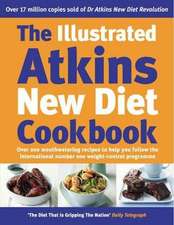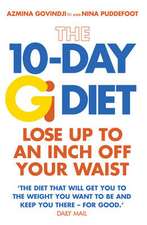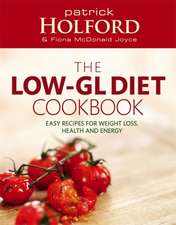Vegetarian and Plant-Based Diets in Health and Disease Prevention
Editat de François Mariottien Limba Engleză Hardback – 30 mai 2017
Broken into five sections, the first provides a general overview of vegetarian / plant-based diets so that readers have a foundational understanding of the topic. Dietary choices and their relation with nutritional transition and sustainability issues are discussed. The second and third sections provide a comprehensive description of the relationship between plant-based diets and health and disease prevention. The fourth section provides a deeper look into how the relationship between plant-based diets and health and disease prevention may differ in populations with different age or physiological status. The fifth and final section of the book details the nutrients and substances whose intakes are related to the proportions of plant or animal products in the diet.
- Discusses the links between health and certain important characteristics of plant-based diets at the level of food groups
- Analyzes the relation between plant-based diet and health at the different nutritional levels, i.e. from dietary patterns to specific nutrients and substances
- Provides a balanced evidence-based approach to analyze the positive and negative aspects of vegetarianism
- Addresses the different aspects of diets predominantly based on plants, including geographical and cultural variations of vegetarianism
Preț: 894.33 lei
Preț vechi: 1084.94 lei
-18% Nou
Puncte Express: 1341
Preț estimativ în valută:
171.15€ • 178.03$ • 141.30£
171.15€ • 178.03$ • 141.30£
Carte tipărită la comandă
Livrare economică 07-21 aprilie
Preluare comenzi: 021 569.72.76
Specificații
ISBN-13: 9780128039687
ISBN-10: 012803968X
Pagini: 922
Dimensiuni: 191 x 235 x 55 mm
Greutate: 2.04 kg
Editura: ELSEVIER SCIENCE
ISBN-10: 012803968X
Pagini: 922
Dimensiuni: 191 x 235 x 55 mm
Greutate: 2.04 kg
Editura: ELSEVIER SCIENCE
Cuprins
1. Occasional meat eaters, vegetarians, lacto-ovo-vegetarians, vegans, omnivores, pescetarians, and other dietary descriptors
2. The importance of lifestyle in vegans and vegetarians: Smoking, alcohol, exercise and other variables.
3. Barriers to increasing plant protein consumption in Western populations
4. Attitudes toward meat and plants in vegetarians
5. Religious variations: vegetarian diets and impact on health status of children
6. Nutrition knowledge of vegetarians
7. Vegetarianism and eating disorders
8. Bran function in vegetarians
9. Geographical aspects of vegetarianism: Vegetarianism in Taiwan
10. Geographical aspects of vegetarianism: Vegetarians in India
11. Dietary transition: Long term trends, animal vs plant energy intake and sustainability issues
12. Plant based diets for mitigating climate change
13. Dietary patterns of plant-based, vegetarian and omnivorous diets
14. Meat consumption and health outcomes
15. Fruits and vegetables intake and disease risk
16. Whole grains and cardiovascular health
17. Nut intake and health
18. Protective components in dietary plants based foods
19. Blood pressure and vegetarian diets
20. Bone health and vegan diets
21. Vegetarian diets and Mood
22. Cancer risk and plant based diets
23. Faecal microbiota and the vegetarian diet
24. Asthma and raw vegetable diets
25. Vegetarian diets, insulin sensitivity and the risk of diabetes
26. Vegetarian diets in people with type-2 diabetes
27. Ischemic heart disease in vegetarians and non-vegetarians
28. Defecation and stools in vegetarians: implications for health
29. Reflux esophagitis and vegetarianism
30. Weight maintenance and weight loss: the adoption of diets based on predominantly plants
31. Vegetarian infants and complementary feeding
32. Nutritional status of vegetarian children
33. Food and meals in vegetarian children and adolescents
34. Vegetarian diets in pregnancy
35. Nutritional profiles of vegetarian menopausal women
36. Nutritional profiles of vegetarian elderly
37. Plant protein, animal protein and protein quality
38. Plant protein, animal protein and cardiometabolic health
39. Vegetarian diet and Zinc status
40. Plant-based diets and Iron status
41. Plant-based diets and Selenium intake and status
42. Vitamin B12 deficiency in vegetarians
43. B Vitamins intake and plasma homocysteine in vegetarians
44. Iodine deficiency, thyroid function and vegetarianism
45. Polyunsaturated fatty acids status in vegetarians
46. Probiotics in nondairy products
47. Dietary exposure to chemicals in vegetarians
2. The importance of lifestyle in vegans and vegetarians: Smoking, alcohol, exercise and other variables.
3. Barriers to increasing plant protein consumption in Western populations
4. Attitudes toward meat and plants in vegetarians
5. Religious variations: vegetarian diets and impact on health status of children
6. Nutrition knowledge of vegetarians
7. Vegetarianism and eating disorders
8. Bran function in vegetarians
9. Geographical aspects of vegetarianism: Vegetarianism in Taiwan
10. Geographical aspects of vegetarianism: Vegetarians in India
11. Dietary transition: Long term trends, animal vs plant energy intake and sustainability issues
12. Plant based diets for mitigating climate change
13. Dietary patterns of plant-based, vegetarian and omnivorous diets
14. Meat consumption and health outcomes
15. Fruits and vegetables intake and disease risk
16. Whole grains and cardiovascular health
17. Nut intake and health
18. Protective components in dietary plants based foods
19. Blood pressure and vegetarian diets
20. Bone health and vegan diets
21. Vegetarian diets and Mood
22. Cancer risk and plant based diets
23. Faecal microbiota and the vegetarian diet
24. Asthma and raw vegetable diets
25. Vegetarian diets, insulin sensitivity and the risk of diabetes
26. Vegetarian diets in people with type-2 diabetes
27. Ischemic heart disease in vegetarians and non-vegetarians
28. Defecation and stools in vegetarians: implications for health
29. Reflux esophagitis and vegetarianism
30. Weight maintenance and weight loss: the adoption of diets based on predominantly plants
31. Vegetarian infants and complementary feeding
32. Nutritional status of vegetarian children
33. Food and meals in vegetarian children and adolescents
34. Vegetarian diets in pregnancy
35. Nutritional profiles of vegetarian menopausal women
36. Nutritional profiles of vegetarian elderly
37. Plant protein, animal protein and protein quality
38. Plant protein, animal protein and cardiometabolic health
39. Vegetarian diet and Zinc status
40. Plant-based diets and Iron status
41. Plant-based diets and Selenium intake and status
42. Vitamin B12 deficiency in vegetarians
43. B Vitamins intake and plasma homocysteine in vegetarians
44. Iodine deficiency, thyroid function and vegetarianism
45. Polyunsaturated fatty acids status in vegetarians
46. Probiotics in nondairy products
47. Dietary exposure to chemicals in vegetarians












